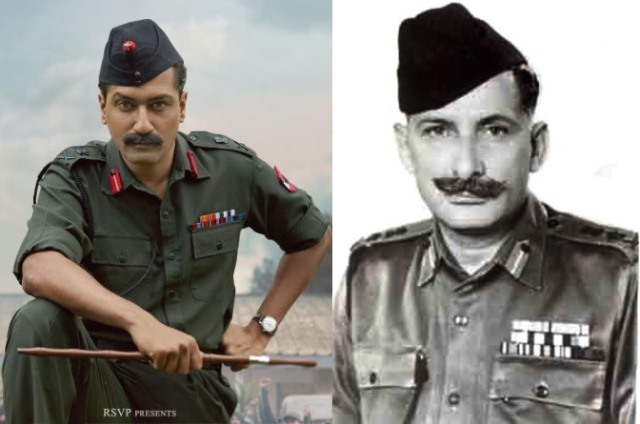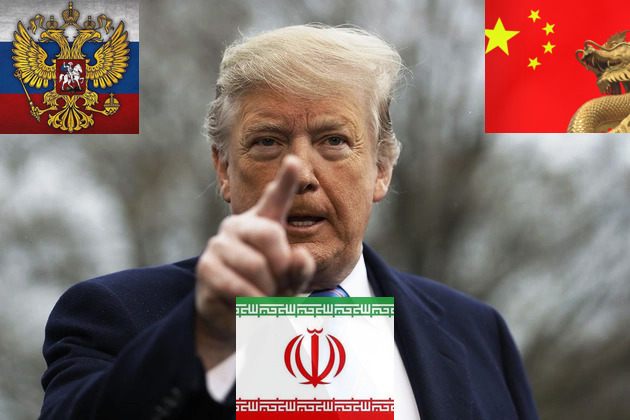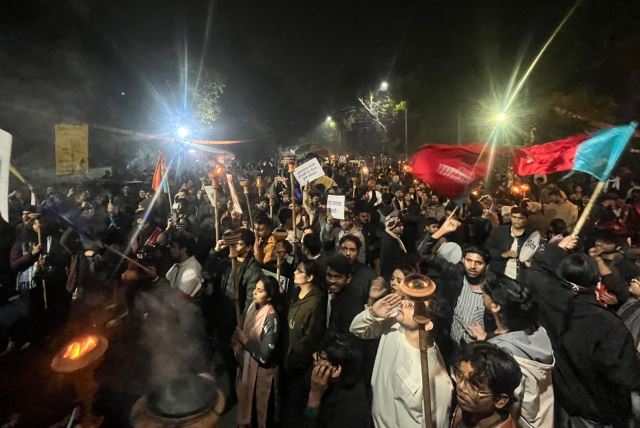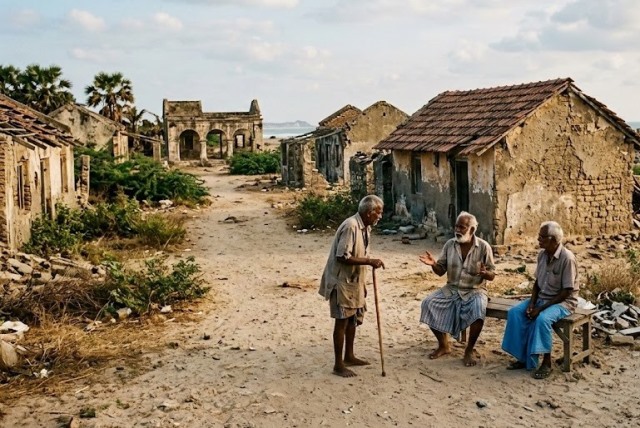
A Long-Overdue Tribute To India’s Finest Soldier
As India prepares to celebrate its “Bangladesh War” of 1971 this month, what better way than to view the biopic of Sam Hormusji Framji Jamshedji Manekshaw, one of its finest soldiers who became a legend in his lifetime?
But an otherwise well-made Sam Bahadur reminds you of changed times, and not merely the years gone by. It dramatises Jawaharlal Nehru as a doddering sick man who failed the nation against the Chinese in 1962. But Indira Gandhi, who led politically and diplomatically to win the 1971 war, also comes across as timid and in complete awe of her army chief.
Making a film about a contemporary person is always difficult. Emphases and interpretations can differ. Perhaps, Director Meghna Gulzar wanted to pitch her hero well above the rest. Perhaps, she ended up sending a political message she did not mean. But she cannot be faulted for choosing Vicky Kaushal to play Sam, a swashbuckling and brilliant soldier.
India’s political class prefers its war heroes on horseback, wielding swords and spears, not in modern-day uniform, with military dictators frequently grabbing political power. For the record, Sam, lionized while in office, was dropped as a hot potato. More was added to the controversies surrounding him by the time he died in 2008. The prime minister and the defence minister of the day kept away. It was a quiet death at his home in South India, away from New Delhi, the rightful place.
Yet, Sam remains India’s modern-day hero who crafted a military victory that was the first in a thousand years, in a war that changed the world map. It was also the quickest, lasting only two weeks, and yet the most decisive. A new nation was born. India secured the surrender of 93,000 Pakistani prisoners of war at a rare public ceremony. Sam chose to keep away, and instead, sent his Army Commander, Lt. Gen. J S Aurora, to accept the surrender.
The Indian Army quit Bangladesh precisely after three months, which was and remains a rarity if one examines the military annals of any country, at any time.
Sam treated the prisoners of war (POWs) decently, strictly following the Geneva Convention. Indian troops were asked to vacate their quarters for them and live in tents. The prisoners celebrated their festivals. On repatriation, each soldier was given a copy of the Quran and gifts.
It was a victory of the rightful, won by the righteous. Post-war, Time magazine noted that the military campaign of a ‘Hindu’ India was led by a Parsi. Its air force was led by a Brahmo, equivalent to a Hindu Protestant. The army’s Eastern Command that liberated Bangladesh had a Sikh chief, and the campaign was planned by his Jewish chief of staff.
“Are you ready for a war? I am not,” Sam told the prime minister and her cabinet on April 27, 1971. He guaranteed them “cent per cent defeat”. None was pleased. But he explained the reasons why India should not hurry – among other things, inadequate preparations, funds and armaments and the time needed for troop movements. It would be unwise to fight a war during the monsoon in riverine East Pakistan. Wait for the winter, he told them.
ALSO READ: Udham Singh – Revenge of a Revolutionary
He got eight months and total command of the operations. He promised “cent per cent victory” and delivered. Manekshaw later recounted this, saying there was a very thin line between becoming a field marshal and being dismissed.
As Independent India’s first field marshal, a largely ceremonial post, he had an extended tenure as the army chief. He was reluctant, knowing that he could not continue without blocking promotions among the top brass.
He was critical of political leadership in private conversations, and when stories were carried, often its victim. One of his memorable quips was: “I wonder whether those of our political masters who have been put in charge of the defence of the country can distinguish a mortar from a motor, a gun from a howitzer, a guerrilla from a gorilla – although a great many of them in the past have resembled the latter.”
His sense of humour conveyed the message but hurt him. A lady reporter asked: “Sir, if you were leading the Pakistan Army, who would have won the war?” Manekshaw’s soldier-like, but undiplomatic, reply was: “Pakistan would have won the war!” All hell broke loose. There were demands to strip him of the field marshal’s rank. Although made in jest, Sam stood by his reply.
Sam had no political ambitions. A visiting American diplomat asked Sam when he would “take over”. Sam retorted: “As soon as General Westmoreland takes over in your country.” Gulzar’s Sam tells the prime minister bluntly: “I have no political ambitions. You do your job, I do mine.”
Unlike others, he famously refused to address her as “madam”, saying the sobriquet was reserved for “certain ladies who are in charge of houses of ill repute”.
Born in 1914, Manekshaw belonged to the first batch to pass from the Indian Military Academy (IMA), India’s Sandhurst. During World War 2, Sam saw action in Burma (now Myanmar) in 1942. In the Battle of Sittang Bridge, he took nine bullets. Taking what seemed last gasps, he found the Military Cross pinned on his bloody chest by Major General Cowan, the deputy commander of the British forces.
In a brilliant biography, Major-General Vinay Singh (retired) records that Cowan probably thought that Sam’s chances of survival were slim. Since the MC cannot be given posthumously, he decided to award it on the spot.
The Australian surgeon initially declined to operate on Sam; he would rather spend time and effort on saving someone less injured. He inquired of Sam what happened. “A bloody mule kicked me.” The surgeon said: “By Jove, you have a sense of humour. I think you are worth saving.”
Sam’s medico father wrote to him at the hospital: “Son, if you smoke or drink now, you are finished.” According to Sam, he did exactly that and that was why he lived.
Post-Independence, Sam was involved in all major military operations. He planned the Kashmir Operations (1947-49) under direct orders from Nehru and Home Minister Sardar Patel.
The 1962 war with China saw him salvaging the debacle of the very superiors who had targeted him. Low morale and bad leadership, not bad fighting, had caused the defeat, he bluntly told Nehru. Soldier-like, he opposed the return of Pakistani territory he had captured as dictated by the Simla Agreement of 1972 and told Indira bluntly that Pakistan’s Z A Bhutto had “made a monkey out of us.”
A field marshal is always on duty,” he said and wore the uniform till his last day in public. Politics and personalities apart, a biopic on Sam Manekshaw was long overdue. Thank you Gulzar and team.
In geo-politically changed times, it is impossible today to repeat that feat of 1971; to have people of that calibre and the combination that worked under those circumstances. There will never be another Indira Gandhi; another Sam.
The writer can be contacted at mahendraved07@gmail.com
For more details visit us: https://lokmarg.com/



